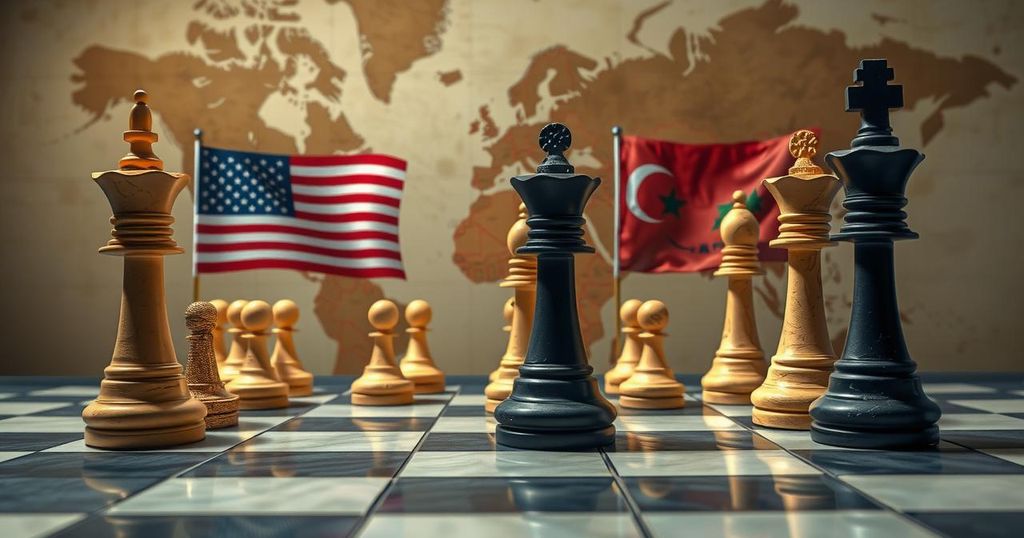World news
AFRICA, AFRICA COMMAND, AMERICA, BELARUS, BIDEN, BRA, BRAK AL - SHATI, EUROPE, EUROPE/ASIA, HA, HARCHAOUI, INTERNATIONAL RELATIONS, ITALY, LIBYA, LONDON, MILITARY, MOSCOW, NORTH AMERICA, PENTAGON, ROME, RUSI, RUSI THINK TANK, RUSSIA, SADDAM, SANCTIONS, TRIPOLI, U. S, U. S. AFRICA COMMAND, UNITED KINGDOM, UNITED STATES, US, VLADIMIR PUTIN, WAR, WASHINGTON
Marisol Gonzalez
0 Comments
Geopolitical Tensions in Libya: The U.S. and Russia’s Struggle for Influence
This article discusses the ongoing geopolitical competition in Libya between the U.S. and Russia. With U.S. military efforts to counter Russian presence led by General Khalifa Haftar, skepticism remains around the effectiveness of these attempts. The involvement of Haftar’s son in building ties with the U.S. adds a layer of complexity, while the Trump administration’s response to these developments is still uncertain.
The geopolitical landscape has shifted with Donald Trump’s intent to cultivate business ties with Vladimir Putin while criticizing U.S. allies. Amid this, Libya remains a focal point of tension between the United States and Russia, reminiscent of Cold War dynamics. Recently, a U.S. Air Force B-52 bomber visited Libya as U.S. generals sought to persuade local leaders to remove the growing number of Russian troops entrenched at desert bases.
The focus of the U.S. diplomatic efforts is General Khalifa Haftar, the military leader governing eastern Libya. His alignment with Russia, which utilizes Libyan territory to bolster regimes in neighboring countries that oppose U.S. interests, poses a challenge. Following Haftar’s visit with Belarus—an ally of Russia—U.S. efforts intensified to wean him away from Moscow’s influence.
According to Jalel Harchaoui of the RUSI think tank, the Pentagon is predominantly driving U.S. engagement in Libya due to the lack of coherent policies from both the Biden and Trump administrations regarding the region. Recent exercises conducted by the U.S. Africa Command involved military personnel from Haftar’s faction and Eastern Libya governmental representatives. Harchaoui highlights Haftar’s claims of cooperation with the U.S. but notes that his ties with Russia are bolstered by military support.
Following the U.S. military visit, Russian Deputy Defense Minister Yunus-Bek Yevkurov made another trip to eastern Libya, where Russian troops have increased significantly since November. Ben Fishman from the Washington Institute expressed skepticism about Haftar’s potential shift away from Russia, asserting that U.S. military presence would not alter Haftar’s strategy, as the eastern military is more organized than the local militias in the western region.
Conversely, optimism arises from Mohamed Eljarh of Libya Outlook, who believes that Haftar’s son, Saddam, is pursuing closer ties with the U.S. amid concerns that Russia is playing both sides in the Libyan landscape. Notably, Saddam visited the U.S. last year, fostering the idea of collaboration with American forces.
However, the response from the Trump administration remains uncertain, as Umberto Profazio from the IISS observes a potential inclination for the U.S. to allow Russian influence in Libya, aligned with the administration’s ambiguous stance on foreign military engagements.
Ultimately, Libya serves as a significant battleground for U.S.-Russia rivalry, with complex relationships influencing the dynamics. While U.S. military efforts aim to extricate Haftar from Russian ties, skepticism about their effectiveness persists. Conversely, emerging relationships with Haftar’s son suggest possible shifts. As the geopolitical chess match unfolds, the U.S. administration’s approach remains a key factor in shaping Libya’s future influence and stability.
Original Source: www.defensenews.com




Post Comment